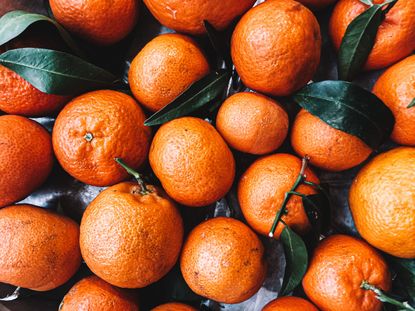Curious Questions
-
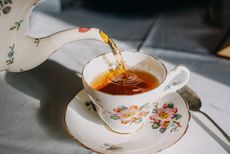
11 golden rules for making a perfect cup of tea
We drink tea every day, but are we doing it correctly? Who decided on the rules and do they really matter? Jonathon Jones reveals all.
By Jonathon Jones Published
-

The BBC and the contender for the greatest April Fool's prank ever played
As April 1 looms, Martin Fone tells the tale of one of the finest stunts ever pulled off.
By Martin Fone Published
-

Curious Questions: Why do the clocks go forward in Spring?
As we move from Greenwich Mean Time to British Summer Time, some of your might be wondering: why — and if we'll always continue to change the clocks twice a year.
By Martin Fone Last updated
-

Curious Questions: Why is pancake day called 'Shrove Tuesday'?
Martin Fone investigates how Shrove Tuesday got its name — and also unveils the history of the day that precedes it, Collop Monday.
By Martin Fone Last updated
-
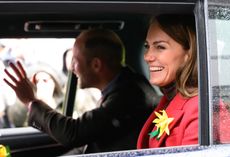
Curious Questions: Will the real Welsh daffodil please stand up
For generations, patriotic Welshmen and women have pinned a daffodil to their lapels to celebrate St David’s Day, says David Jones, but most are unaware that there is a separate species unique to the country.
By Country Life Published
-

Nobody has ever been able to figure out just how long Britain's coastline is. Here's why.
Welcome to the Coastline Paradox, where trying to find an accurate answer is more of a hindrance than a help.
By Martin Fone Published
-

The true story of St Valentine, his legend and legacy of love
Whatever the truth of the real St Valentine, the middle of February has been a favourite time for lovers since records began. We take a look at the curious history of St Valentine, and how an ancient martyr came to be remembered as a champion of romantic love.
By Country Life Last updated
-

The real language of flowers, or how to decode your Valentine's day bouquet
On Valentine's Day, Martin Fone takes a look at the true meaning behind flowers, decoding what each individual bloom says about the receiver - or the sender.
By Martin Fone Last updated
-

From fighting for stockings to flying on the Moon: How nylon changed the world
Almost 90 years after it was first discovered, Martin Fone looks at the history of this mass produced man-made fibre.
By Martin Fone Published
-

Curious Questions: Why do woolly hats have bobbles?
Some can rock a bobble hat, others will always resemble Where’s Wally, but the big question is why the bobbles are there in the first place. Harry Pearson finds out as he celebrates a knitted that creation belongs on every hat rack.
By Harry Pearson Published
-

Curious questions: how an underground pond from the last Ice Age almost stopped the Blackwall Tunnel from being built
You might think a pond is just a pond. You would be incorrect. Martin Fone tells us the fascinating story of pingo and dew ponds.
By Martin Fone Published
-
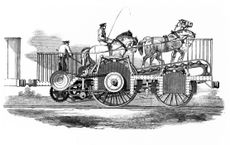
Curious questions: How a horse on a treadmill almost defeated a steam locomotive
The wonderful tale of Thomas Brandreth's Cycloped and the first steam-powered railway.
By Martin Fone Published
-

'Squopping and squidging': Who invented tiddlywinks?
Today's Curious Question takes a look at one of the nation's favourite parlour games.
By Martin Fone Published
-

Mince pies really did once contain meat — and this Victorian recipe will convince you that they should to this day
Once packed with meat, such as ox tongue and mutton, alongside dried and candied fruit and extravagant spices, the mince pie is not what it once was — and food historian Neil Buttery says that's made them worse.
By Neil Buttery Published
-

Curious Questions: Did the Victorians pave the way for the first ULEZ cameras in the world?
Martin Fone takes a look at the history of London's coalgates, and finds that the idea of taxing things as they enter the City of London is centuries old.
By Martin Fone Published
-
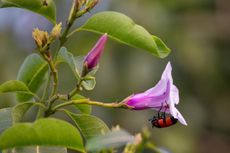
Curious Questions: What's in a (scientific) name? From Parastratiosphecomyia stratiosphecomyioides to Myxococcus llanfair pwll gwyn gyll go gery chwyrn drobwll llan tysilio gogo goch ensis, and everything in between
Scientific names are baffling to the layman, but carry all sorts of meanings to those who coin each new term. Martin Fone explains.
By Martin Fone Published
-

You've got peemail: Why dogs sniff each other's urine
Ever wondered why your dog is so fond of sniffing another’s pee? 'The urine is the carrier service, the equivalent of Outlook or Gmail,' explains Laura Parker.
By Laura Parker Published
-

Curious Questions: Why do we carve pumpkins at Halloween?
The devilishly smiling image of Jack O'Lantern is inseparable from Halloween, but what's the story behind it? Martin Fone explains — and discovers that the festival many complain about as an American import has been this side of the Atlantic for centuries.
By Martin Fone Published
-

Curious Questions: Margarine used to be pink — but why?
Margarine has been a staple of our breakfast tables for over a century, but it hasn't always had a smooth ride — particularly from the dairy industry, who managed to impose a most bizarre sanction on their easily-spreadable, industrially mass-produced rival. Martin Fone explains.
By Martin Fone Published
-

Who was the real St Crispin, and what did he have to do with the Battle of Agincourt?
You have questions about Shakespeare's most famous speech. We have answers.
By Ian Morton Published
-

Curious Questions: Why was the original Euston Station destroyed in one of the greatest acts of cultural vandalism Britain has ever seen?
One of the great masterpieces of 19th century, the original Euston Station, was built in the years after Queen Victoria came to the throne. Less than 125 years later it was razed to the ground; Martin Fone takes a look at the reasons why.
By Martin Fone Published

